Filter by

Screen Ecologies: Art, Media, and the Environment in the Asia-Pacific Region
Images of environmental disaster and degradation have become part of our everyday media diet. This visual culture focusing on environmental deterioration represents a wider recognition of the political, economic, and cultural forces that are responsible for our ongoing environmental crisis. And yet efforts to raise awareness about environmental issues through digital and visual media are riddle…
- Edition
- -
- ISBN/ISSN
- 9780262334013
- Collation
- 1 online resource (vii, 210 pages) :illustrations.
- Series Title
- -
- Call Number
- -

The Environmental Advantages of Cities: Countering Commonsense Antiurbanism
Conventional wisdom about the environmental impact of cities holds that urbanization and environmental quality are necessarily at odds. Cities are seen to be sites of ecological disruption, consuming a disproportionate share of natural resources, producing high levels of pollution, and concentrating harmful emissions precisely where the population is most concentrated. Cities appear to be parti…
- Edition
- -
- ISBN/ISSN
- 9780262314091
- Collation
- 1 online resource (ix, 234 pages) :illustrations, maps.
- Series Title
- -
- Call Number
- -

A Fragmented Continent: Latin America and the Global Politics of Climate Change
How Latin American countries became leading voices and innovators on addressing climate change -- and what threatens their leadership.OCLC-licensed vendor bibliographic record.
- Edition
- -
- ISBN/ISSN
- 9780262330152
- Collation
- 1 online resource (xxi, 274 pages).
- Series Title
- -
- Call Number
- -
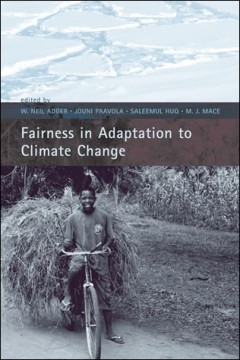
Fairness in adaptation to climate change
Interdisciplinary scientific and policy analysis on the challenges of ensuring that adaptation to global climate change does not place unfair burdens on already vulnerable populations.OCLC-licensed vendor bibliographic record.
- Edition
- -
- ISBN/ISSN
- 9780262266819
- Collation
- 1 online resource (xvi, 319 pages) :illustrations
- Series Title
- -
- Call Number
- -

Managing Institutional Complexity: Regime Interplay and Global Environmental …
"A Core Research Project of the International Human Dimensions Programme on Global Environmental Change (IHDP)."Here, experts investigate how states and other actors can improve inter-institutional synergy. They examine the complexity of over-lapping environmental governance structures.OCLC-licensed vendor bibliographic record.
- Edition
- -
- ISBN/ISSN
- 9780262298346
- Collation
- 1 online resource (xvi, 353 pages) :illustrations.
- Series Title
- -
- Call Number
- -
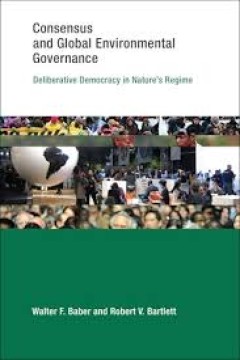
Consensus and global environment governance :deliberative democracy in nature…
In this book, Walter Baber and Robert Bartlett explore the practical and conceptual implications of a new approach to international environmental governance. Their proposed approach, juristic democracy, emphasizes the role of the citizen rather than the nation-state as the source of legitimacy in international environmental law; it is rooted in local knowledge and grounded in democratic deliber…
- Edition
- -
- ISBN/ISSN
- 9780262327046
- Collation
- 1 online resource (xviii, 251 pages) :map.
- Series Title
- -
- Call Number
- -
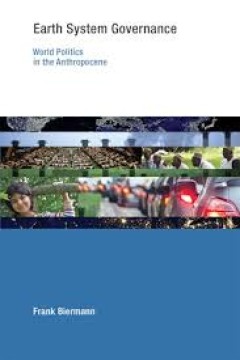
Earth System Governance: World Politics in the Anthropocene
In an era of planet-wide transformation, we need a new model for planet-wide environmental politics. This book proposes 'earth system' governance as just such a new paradigm. It offers both analytical and normative perspectives. It provides detailed analysis of global environmental politics in terms of five dimensions of effective governance: agency, particularly agency beyond that of state act…
- Edition
- -
- ISBN/ISSN
- 9780262322928
- Collation
- 1 online resource.
- Series Title
- -
- Call Number
- -

Climate Policy and Nonrenewable Resources: The Green Paradox and Beyond
Too rapidly rising carbon taxes or the introduction of subsidies for renewable energies induce owners of fossil fuel reserves to increase their extraction rates for fear of their reserves becoming worthless. Fossil fuel use is thus brought forward. The resulting acceleration of global warming and counter-productivity of well-intended climate policy has been coined the Green Paradox. This volume…
- Edition
- -
- ISBN/ISSN
- 9780262319836
- Collation
- 1 online resource :illustrations.
- Series Title
- -
- Call Number
- -
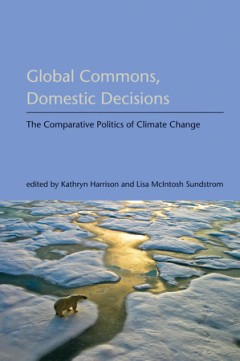
Global commons, Domestic decisions :the comparative politics of climate change
Climate change represents a “tragedy of the commons” on a global scale, requiring the cooperation of nations that do not necessarily put the Earth's well-being above their own national interests. And yet international efforts to address global warming have met with some success; the Kyoto Protocol, in which industrialized countries committed to reducing their collective emissions, took effe…
- Edition
- -
- ISBN/ISSN
- 9780262289481
- Collation
- 1 online resource (xi, 312 pages) :illustrations.
- Series Title
- -
- Call Number
- -
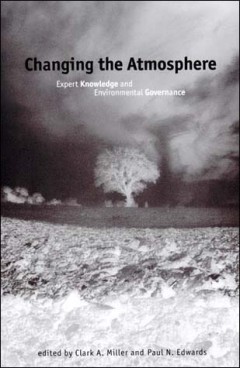
Changing the Atmosphere: Expert Knowledge and Environmental Governance
In recent years, Earth systems science has advanced rapidly, helping to transform climate change and other planetary risks into major political issues. Changing the Atmosphere strengthens our understanding of this important link between expert knowledge and environmental governance. In so doing, it illustrates how the emerging field of science and technology studies can inform our understanding…
- Edition
- -
- ISBN/ISSN
- 9780262279819
- Collation
- 1 online resource (xii, 385 pages) :illustrations.
- Series Title
- -
- Call Number
- -
 Computer Science, Information & General Works
Computer Science, Information & General Works  Philosophy & Psychology
Philosophy & Psychology  Religion
Religion  Social Sciences
Social Sciences  Language
Language  Pure Science
Pure Science  Applied Sciences
Applied Sciences  Art & Recreation
Art & Recreation  Literature
Literature  History & Geography
History & Geography